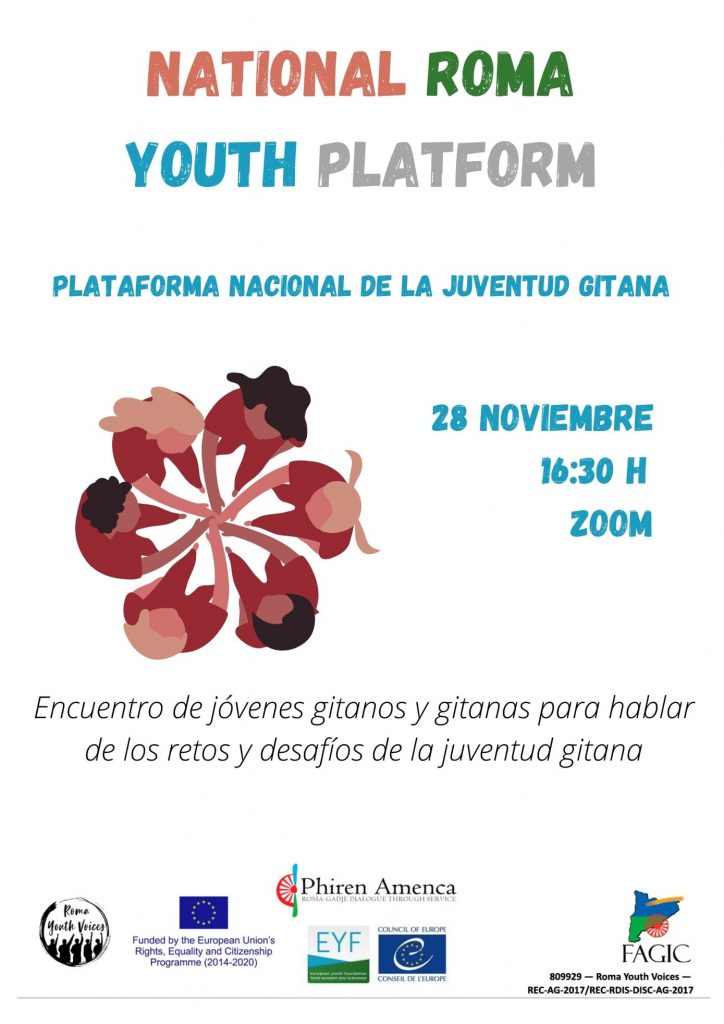On Saturday November 28, 2020 more than 20 Roma youngsters from different areas of Spain, including the Canary Islands, met online to discuss issues affecting Roma youth generally and how they can become united and stronger as a force for change.
The meeting was moderated by a young Roma, Aarón Moreno, from the neighborhood of Sant Roc in Badalona (Barcelona) who graduated recently in the field of Social Education and is currently studying a Masters degree to become a Teacher in secondary education. An interesting aspect of this was that some of the youngsters knew each other, but many did not, so for the majority of them it was the first time to participate in a meeting/platform of Roma youngsters.
As Covid-19 is changing the life of the population in general, Aarón thought it was a good topic to start with and then also to see how the families of youngsters were. Regarding education access, the majority of participants commented that the lockdown significantly impacted Roma youngsters as many didn’t have the tools or knowledge to follow the online lessons. Parents couldn’t help either, so many abandoned their studies during the lockdown. Regarding employment, the ones who are working and in a way were not as affected by the lockdown, had to support their parents and family. Many of the Roma parents are continuing to work at the “mercadillo” (flea/street market) which was prohibited for almost 5 months. Therefore, youngsters had to contribute fully to support parents. An important aspect of Covid-19 was the fact that out of fear of spreading the Covid virus to grandparents and elderly of the community meant that the youngsters didn’t visit them. This is also affecting their previous routines of visiting grandparents almost every day and spending time together during weekends. This has currently stopped and it is a feeling that young Roma are struggling with.
Another interesting topic touched upon was that of discussion surrounding antigypsyism. All participants agreed that antigypsyism is the great battle (war) to fight against and it has risen since the lockdown, especially in online social networks. They spoke of how they became strong in social networks by creating accounts to show the diversity of Roma people and to show the society that being Roma means something different than what they have in their mind. Also, they replied to antigypsyism comments and started an interesting discussion on how social network tools can also contribute to antigypsyism and what is the best strategy to fight against it: to reply to people or say nothing, so that there is no incitement for people to continue the spreading of antigypsyism.
Related to social networks followed the discussion on Roma youth representation. Almost all agreed that they have a “voice” they use on social networks to have a “voice”, but it is an individual voice. They don’t have a “group voice” or a voice which could represent the Roma youngsters. The problem of Roma youth representation is that traditionally the voice of Roma is done by the Roma organisations in Spain and as they don’t have “space” in the Roma associations, their voice as “youth” is not heard: it is not heard by neither by the Roma associations nor by the administrations or governments. So, the point was… what do young Roma want? Do they want to create a permanent “informal” platform? Do they want to create an organisation? It was agreed that young Spanish Roma participants will explore this point further and with much more time.
After almost 2 and a half hours, some of the youngsters proposed to fix a date every month in order to have regular meetings, so that a regular venue for meeting is available. They expressed the need for someone to take the leadership role of the group and keep contact amongst the group. Young Roma agreed on having more informal meetings in order to see what they really want in the future and how to become stronger.
The Spanish Roma Youth Platform preparation took place as part of the Roma Youth Voices project in partnership with the Federación de Asociaciones Gitanas de Cataluña – FAGiC in Spain.



